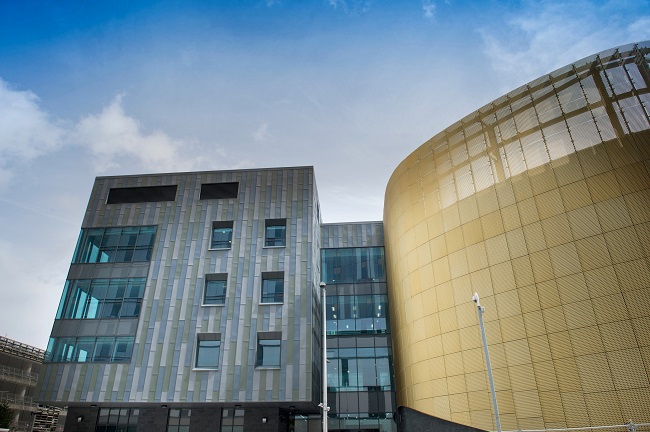
Glasgow Lighthouse Lab facility begins processing samples for COVID-19
The Lighthouse Laboratory in Glasgow – a major new COVID-19 testing facility based in Scotland – is now operational.
The Lighthouse Lab, which officially started testing samples for COVID-19 this week, is part of what will be the biggest network of diagnostic testing facilities in British history, alongside other Lighthouse Lab sites in Milton Keynes and Alderley Park, which were opened in recent days. The Lighthouse lab project funded by the UK Government.
The newly operational lab will will test samples from the regional test centres where NHS staff and frontline workers with suspected COVID-19 infections are tested. It is hoped the lab will quickly move towards processing several thousand tests per day, before scaling up further to tens of thousands of tests per day.
The Lighthouse Lab in Glasgow is hosted by the University of Glasgow at their Queen Elizabeth University Hospital Campus, and opened in collaboration with the Scottish Government, industry experts from BioAscent and the University of Dundee, and the Cancer Research UK Beatson Institute.
The Lighthouse Labs are being established across the UK to analyse samples taken from regional testing centres. Key worker testing will be carried out at drive-through facilities before samples are assigned and delivered to the closest Lighthouse Lab with capacity. It is anticipated that the Lighthouse Lab in Glasgow will process tests from across the UK, however as the number of tests undertaken in Scotland increases, the Glasgow Lab will work to service these in the first instance. In Scotland there are currently three regional testing centres in Glasgow, Aberdeen and Edinburgh.
The Lab is currently equipped with 20 protective cabinets sourced from the University of Glasgow, a fleet of fast high throughput ThermoFisher PCR machines and RNA extractors. Much of the equipment has been sourced from University of Glasgow labs, and moved to the new testing centre in order to make rapid COVID-19 response work possible.
The Glasgow facility will be staffed on a 24/7 basis by around 100 staff members. More than 800 volunteers came forward to help with the facility, including highly experiences molecular scientists, technicians and bioinformaticians – all with the relevant skills and experience to carry out COVID-19 testing. The facility has been made possible through the work and commitment of partners, volunteers and University of Glasgow staff, including lab technicians, IT services and colleagues from the Professional Services across the College of Medical, Veterinary and Life Sciences in Glasgow..
The Lighthouse Lab is situated in the University of Glasgow’s Clinical Innovation Zone, a space that was designed to meet industrial scale standards and was therefore readily able to be transformed into a testing facility in response to the COVID-19 UK outbreak.
Professor Dame Anna Dominiczak, University of Glasgow Vice Principal and Head of the College of Medical, Veterinary and Life Sciences, who leads the team said: “I am pleased that after weeks of hard work and continued effort by all involved, the University of Glasgow can now deliver the country new, large-scale testing facility, in conjunction with our industry partners and the NHS.
“I remain incredibly grateful to all partners and colleagues who have volunteered their time, expertise and skills for this testing facility. As a result of their willingness to help, we have equipped, staffed and set-up a new testing facility that is now operational and will be vitally important in the NHS efforts against this coronavirus pandemic. It has been said all over the world and confirmed by the WHO that we have to test, test and test more to fight the virus that has killed so many.”
Scottish Secretary Alister Jack said: “The UK Government has committed to expanding our testing capacity across the UK. The completion of our network with the Lighthouse Lab in Glasgow is a tremendous achievement for all the partners in such challenging circumstances and only five weeks after this project was started.
“Scotland has world-class universities and I am pleased they have been involved in this UK-wide effort as we work together to protect the NHS and save lives.”
Dr Phil Jones, BioAscent’s Chief Scientific Officer said “BioAscent is extremely proud to be able to help in this critical work and provide on-site technical expertise needed to set up the testing facility. We’ve been able to contribute our know-how in vital disciplines including high-throughput screening, assay development and sample logistics, all of which are areas of specialism for the company. We think the Lighthouse Labs represent a great example of collaboration between SMEs, like BioAscent, Universities and large companies with a shared common goal to quash COVID.”
Dr Jodie Hay, a Chronic Lymphocytic Leukemia researcher at the University of Glasgow, is one of the volunteers at The Lighthouse Lab in Glasgow. A cancer scientist with experience of working with patient samples and molecular lab techniques, Dr Hay volunteered so she could use her skills to help with COVID-19 response in the UK.
Dr Hay said: “I was one of the first volunteers selected to begin working in the Lighthouse Lab in Glasgow and it has been incredible to see how quickly everyone has been able to get this lab up and running so that we can begin processing the testing samples.
“Like my other colleagues working in the lab, we volunteered so that we could use the skills and expertise we have from our usual lab work in this response against COVID-19. Although these are challenging times, it feels positive to be able to use my skills and experience in this way and to be able to help.”
The Lighthouse Labs UK are coordinated by Chris Molloy of the Medicines Discovery Catapult , and the project is supported by partners ThermoFisher Scientific, Amazon, Boots and Royal Mail, alongside the Wellcome Trust. The Lighthouse Lab in Glasgow is supported by two local partners, the BioAscent and the University of Dundee.